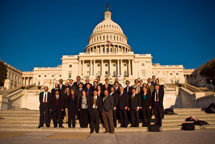
Handy Links
SLAC News Center
SLAC Today
- Subscribe
- Archives: Feb 2006-May 20, 2011
- Archives: May 23, 2011 and later
- Submit Feedback or Story Ideas
- About SLAC Today
SLAC News
Lab News
- Interactions
- Lightsources.org
- ILC NewsLine
- Int'l Science Grid This Week
- Fermilab Today
- Berkeley Lab News
- @brookhaven TODAY
- DOE Pulse
- CERN Courier
- DESY inForm
- US / LHC
SLAC Links
- Emergency
- Safety
- Policy Repository
- Site Entry Form

- Site Maps
- M & O Review
- Computing Status & Calendar
- SLAC Colloquium
- SLACspeak
- SLACspace
- SLAC Logo
- Café Menu
- Flea Market
- Web E-mail
- Marguerite Shuttle
- Discount Commuter Passes
-
Award Reporting Form
- SPIRES
- SciDoc
- Activity Groups
- Library
Stanford
Around the Bay
Report on the SLUO Annual Washington D.C. Trip
 Each year, the SLAC Users Organization (SLUO) Executive Committee organizes a trip to Washington D.C. with Fermilab and, recently, U.S. Large Hadron Collider
(LHC) users. The trip is a valuable opportunity to meet with members of Congress and their staff, share the importance of the science and its benefits to the nation, and listen to what they have to say about science and their expectations for the coming year. The sudden change in direction for basic research funding in last year's Congressional budget process made a visit to Washington even more important.
Each year, the SLAC Users Organization (SLUO) Executive Committee organizes a trip to Washington D.C. with Fermilab and, recently, U.S. Large Hadron Collider
(LHC) users. The trip is a valuable opportunity to meet with members of Congress and their staff, share the importance of the science and its benefits to the nation, and listen to what they have to say about science and their expectations for the coming year. The sudden change in direction for basic research funding in last year's Congressional budget process made a visit to Washington even more important.
The messages this year were loud and clear: Congress regrets what happened to the federal science budget last year, but this year the process is made even more complicated by the election and it's very unlikely that normal Congressional appropriations will happen until after the Presidential election. In addition, we learned there was the possibility of Congress seeking a supplemental appropriation for science and efforts were beginning in both the House and Senate to make this happen in a bi-partisan way. The message to our High Energy Physics (HEP) community was also clear: the science is compelling, but we also need to communicate the tangible benefits of HEP to American education, industry, and innovation. In our continuing dialog with Congress and the nation about HEP, we must clearly explain the science case and the impact of the science on the education pipeline as well as technological innovation, industry, and medicine.
This year's trip, in conjunction with the Fermilab Users' Executive Committee (UEC) and the U.S. LHC Users' Organization (USLUO), brought together about 30 users from all over the U.S. and the world, including many students, post-docs and faculty. We spent three days in Washington D.C. from March 12th to 14th meeting with about 150 members of Congress, including two-thirds of the membership of relevant appropriations subcommittees. We also met with representatives from the President's Office of Management and Budget (OMB) and Office of Science and Technology Policy (OSTP), as well as Undersecretary for Science Raymond Orbach, Department of Energy (DOE) Deputy Director for Science Programs Pat Dehmer, Head of the DOE Office of High Energy Physics Dennis Kovar, Head of the National Science Foundation (NSF) Physics Division Joseph Dehmer and NSF Program Directors for Elementary Particle Physics Marvin Goldberg and James Reidy.
It is critical that the community continues to express to Congress the value of basic science, physics, and HEP in particular. Organized trips like the one we made in March take a lot of effort, and happen only about once per year. The process of engaging Congress on the importance of science, and specifically HEP, is a continuous process. We encourage you, as members of this vibrant scientific community, to tell them about your work, put yourself in a broader context of science and education, and thank members of Congress for any past support for basic research. It will not hurt to emphasize the impact of physics research in our everyday lives, from the world-wide web to the application of particle accelerators to cancer therapy.
Basic research is now, more than ever, important to the development of our nation's economic future. As staff and users of a great national laboratory, you are part of that development. Given that this is likely to be a tough Congressional year, your voice is more important than ever in Washington and in your local district. The SLUO trip in March is part of what we hope is a much larger effort in 2008 to continue to raise awareness on the economic and educational benefits of research.
—Stephen Sekula and Greg Madejski, on behalf of the SLUO Executive Committee, SLAC Today, April 15, 2008